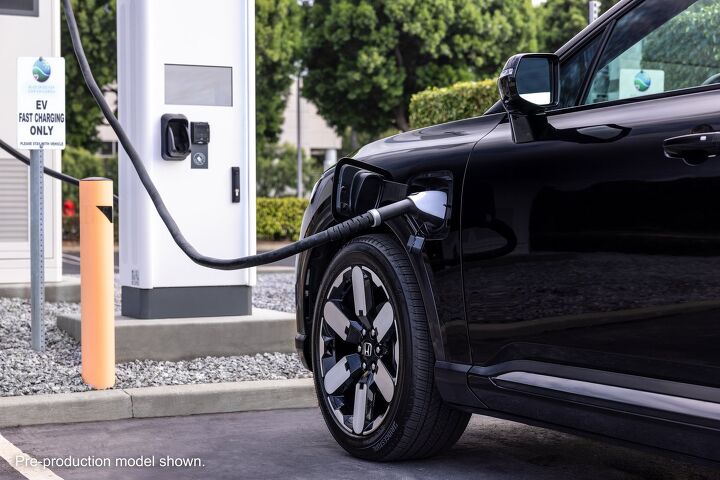Report: Honda Considers Building New EV Factory in Canada

The Honda Motor Company has reportedly been going over prospective plans to build a $13.83 billion facility in Canada that would focus on the production of electric vehicles. Japan's Nikkei news group broke the story over the weekend, suggesting the site could include on-site battery production that would help the manufacturer with regional content requirements tied to U.S. incentives.
While the federal EV tax credit scheme was never supposed to be an indefinite program, changes made under the Biden administration have allowed manufacturers to continue taking advantage if they can adhere to specific content requirements stipulating that materials and labor be sourced within North America. Meanwhile, Canada has been eager to see more domestic production, has an EV incentive structure of its own, and seems eager to work with Honda.
In fact, the CBC just reported that Honda Global and Honda Canada executives already met with the Canadian government last month and plan to do so again to move the prospective program along.
From the CBC:
This week's meeting comes after senior executives from Honda Global and Honda Canada met with Industry Minister François-Philippe Champagne and other senior officials last month, according to sources with direct knowledge of the meetings.
Talks are supposed to focus around where the factory would be located (presumably somewhere in Ontario) and how the Canadian government might help. However, Honda isn’t expected to make any decisions until the end of 2024. The manufacturer has remained aloof, stating that it’s considering numerous projects so that it might adhere to its promise of building nothing but all-electric vehicles by 2040. But we’ve seen the EV goalpost shift frequently in recent years across brands, making us hesitant to assume anything.
For now, all Honda has said is that it’s prioritizing its joint venture with LG Energy Solutions in Jeffersonville, Ohio. The site, which broke ground earlier this year, is supposed to help turn the region into a hub for Honda’s electrified products. Assuming the facility is completed on time, production is supposed to commence late in 2025. But it would be a much smaller facility than what’s being discussed for Canada. The Ohio joint venture is supposed to come in around $3.5 billion, with hundreds of millions more going toward retooling existing facilities for EVs.
The hypothetical Canadian plant was, according to NIkkei, was said to represent an investment of roughly $13.83 billion (USD). This is roughly what we’ve seen other automakers pour onto similar concepts designed to adhere to their own electrification promises. But EV sales have begun to slow in recent months and there remains a meaningful subset of the market that simply isn’t interested in them.
Truth be told, plenty of that is bound to be attributable to the present economic conditions. Modern vehicle interfaces are also turning people off. While they’re hardly limited to all-electric vehicles, EVs frequently represent the most egregious examples of what the industry is doing. There are also horror stories regarding battery fires and people trying to get their EVs serviced only to find the dealership has no clue how to handle the situation.
Some of these issues are overblown while others are simply the result of automakers not having established the proper protocols on their new products. Regardless, it’s making it harder to sell all-electric vehicles at a time when most Western governments are doing what they can to force the industry into building them. Numerous European countries (and even a few states in America) have set deadlines to prohibit the sale of newly built gasoline vehicles by 2035. Meanwhile, automakers would like to benefit from the heavy government incentives associated with electric vehicles.
This makes the prospective Canadian facility an appetizing gamble. Honda would be able to localize manufacturing and some of the raw materials it needs for batteries. But it’s still not clear to anybody what the automotive landscape will actually look like in 10 years. EV adoption rates are not keeping pace with industry estimates and previous investments have broadly failed to yield any real profitability. Honda is undoubtedly weighing the odds, perhaps even taking into account the ramifications of a political shift in the Western world. Tomorrow’s leaders may not be interested in electrification and nobody wants to be in the midst of a multi-billion-dollar construction project if deregulation ends EV subsidies and emissions quotas that are effectively driving the project.
It’s a lot for Honda to think about and Canada is assumed to try and sweeten whatever deal it can to add more domestic jobs. Leadership seems eager to frame the nation as a global leader in EV production and the country’s natural resources may actually allow for that. But it’ll probably be months before we hear more about this and perhaps a full year before Honda feels comfortable making a decision.
[Image: Honda]
Become a TTAC insider. Get the latest news, features, TTAC takes, and everything else that gets to the truth about cars first by subscribing to our newsletter.

A staunch consumer advocate tracking industry trends and regulation. Before joining TTAC, Matt spent a decade working for marketing and research firms based in NYC. Clients included several of the world’s largest automakers, global tire brands, and aftermarket part suppliers. Dissatisfied with the corporate world and resentful of having to wear suits everyday, he pivoted to writing about cars. Since then, that man has become an ardent supporter of the right-to-repair movement, been interviewed on the auto industry by national radio broadcasts, driven more rental cars than anyone ever should, participated in amateur rallying events, and received the requisite minimum training as sanctioned by the SCCA. Handy with a wrench, Matt grew up surrounded by Detroit auto workers and managed to get a pizza delivery job before he was legally eligible. He later found himself driving box trucks through Manhattan, guaranteeing future sympathy for actual truckers. He continues to conduct research pertaining to the automotive sector as an independent contractor and has since moved back to his native Michigan, closer to where the cars are born. A contrarian, Matt claims to prefer understeer — stating that front and all-wheel drive vehicles cater best to his driving style.
More by Matt Posky
Latest Car Reviews
Read moreLatest Product Reviews
Read moreRecent Comments
- Varezhka I have still yet to see a Malibu on the road that didn't have a rental sticker. So yeah, GM probably lost money on every one they sold but kept it to boost their CAFE numbers.I'm personally happy that I no longer have to dread being "upgraded" to a Maxima or a Malibu anymore. And thankfully Altima is also on its way out.
- Tassos Under incompetent, affirmative action hire Mary Barra, GM has been shooting itself in the foot on a daily basis.Whether the Malibu cancellation has been one of these shootings is NOT obvious at all.GM should be run as a PROFITABLE BUSINESS and NOT as an outfit that satisfies everybody and his mother in law's pet preferences.IF the Malibu was UNPROFITABLE, it SHOULD be canceled.More generally, if its SEGMENT is Unprofitable, and HALF the makers cancel their midsize sedans, not only will it lead to the SURVIVAL OF THE FITTEST ones, but the survivors will obviously be more profitable if the LOSERS were kept being produced and the SMALL PIE of midsize sedans would yield slim pickings for every participant.SO NO, I APPROVE of the demise of the unprofitable Malibu, and hope Nissan does the same to the Altima, Hyundai with the SOnata, Mazda with the Mazda 6, and as many others as it takes to make the REMAINING players, like the Excellent, sporty Accord and the Bulletproof Reliable, cheap to maintain CAMRY, more profitable and affordable.
- GregLocock Car companies can only really sell cars that people who are new car buyers will pay a profitable price for. As it turns out fewer and fewer new car buyers want sedans. Large sedans can be nice to drive, certainly, but the number of new car buyers (the only ones that matter in this discussion) are prepared to sacrifice steering and handling for more obvious things like passenger and cargo space, or even some attempt at off roading. We know US new car buyers don't really care about handling because they fell for FWD in large cars.
- Slavuta Why is everybody sweating? Like sedans? - go buy one. Better - 2. Let CRV/RAV rust on the dealer lot. I have 3 sedans on the driveway. My neighbor - 2. Neighbors on each of our other side - 8 SUVs.
- Theflyersfan With sedans, especially, I wonder how many of those sales are to rental fleets. With the exception of the Civic and Accord, there are still rows of sedans mixed in with the RAV4s at every airport rental lot. I doubt the breakdown in sales is publicly published, so who knows... GM isn't out of the sedan business - Cadillac exists and I can't believe I'm typing this but they are actually decent - and I think they are making a huge mistake, especially if there's an extended oil price hike (cough...Iran...cough) and people want smaller and hybrids. But if one is only tied to the quarterly shareholder reports and not trends and the big picture, bad decisions like this get made.


































Comments
Join the conversation
Oof. Canada is a disaster right now. And why Honda? Do you like just throwing money away?
A Honda EV made in Canada. That's 1 out of 3 for me.